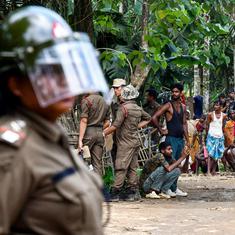In his poem "Tonight I Can Write", Pablo Neruda states that “Love is so short, forgetting is so long”. Akhil Katyal’s latest collection of poetry, The Last Time I Saw You, is centred around a similar crisis of love and loss. In the very first poem of the collection, "Etymology", Katyal draws this connection, likening grief to “a sudden expansion of time” and “a traffic of remembering”. And it is this exploration into fragments of memory – and its unconscious manifestations – that form the strongest parts of this collection. Even the title – “The Last Time I Saw You” – brings to mind a sense of being anchored in a moment from the past – one that quietly intrudes on the present.
Attraction and dread
Katyal’s poems focus on the routines relationships function within – and how they are interrupted by heartbreak and abandonment. In the poem “First Days”, we enter a sepia-tinged memory of the “dailiness” that a relationship begins to inhabit from its very beginning. While the speaker admits that “the chips were already falling” the first night he spent with the lover, the poem ends in a moment of shared quiet – the lover “quietened the city” for the speaker of the poem. In contrast to this peace, in poems like “The Nape of His Neck” and “For G, One Evening Returned From Work”, we see the breathlessness of desire reflected in the internal rhyme deployed by Katyal – with attraction and dread coexisting in the speaker’s psyche.
In the title poem, Katyal’s speaker maps a day that’s cut with moments of heartbreak against the backdrop of an emptying city filled with “a grey stillness, quietly spreading” – seemingly a reference to the coronavirus pandemic. Katyal’s speaker documents the “quiet file” of migrant workers forced to leave the city on the day his lover leaves him. He admits that he doesn’t remember the colour of that “fateful” sky. Katyal juxtaposes the impending tragedy of heartbreak with the political tragedy of forced migrancy – the absence of the lover and the absence of the city’s workforce cause the future “to stop answering”. The city is as much a character in Katyal’s poems as the lost lover – the city is a stage for memory, fantasy, and moments of reckoning with loss, as we see in poems like “The Photograph, Now Untraceable” and “When the Night Market in Bhogal Closes”.
Katyal’s fascination with spaces doesn't stop with his poems about Delhi – he situates poems in the space of the domestic. In “The Room Became Ordinary Again”, the speaker revisits the space of his bedroom, finding that it's been transformed from the sacred space it once was into a regular room, that “no longer housed miracles”. Similarly, in “On One Of Those Long Walks”, the speaker visits his former lover’s neighbourhood. Fretting over his appearance, he plays a “game of lost and found”, seeing his former beloved in every stranger on the street – despairingly, he ends the poem saying “All the people in the world/ keep turning out not to be you.”
Suffering through the senseless confusion of abandonment, the speaker turns to language to make sense of his new reality. In “I Translate Your Name Into Nine Languages”, we see the speaker look at the lover in different ways, while in “Nickname”, he mourns the loss of the lover through the metaphor of a nickname as something that breeds intimacy. Here, language provides some clarity in the face of heartbreak, but in poems like “Day One of Learning Italian”, the speaker confronts the limitations and challenges of language – how it “doesn’t allow you to step out of everything”. In “Scrabble”, the possibilities of a relationship coalesce with the possibilities of language – we get a sense that the speaker scrambles to make meaning out of what he has, with a kind of fervent desperation. The confusion of the absence of a lover is conflated with the complexity of language.
Wisdom of literary heroes
Though the speaker recognises the failure of language to save him, we see him seek wisdom from his literary heroes. This collection from Katyal is rife with references, from Eunice De Souza, who makes an appearance more than once, to Mary Oliver and Rilke. In “When”, the speaker confronts the legacy of departed artists like Begum Akhtar and Agha Shahid Ali, while thinking simultaneously of the nature of endings – how sudden and destabilising they are. While some literature allows the speaker to go deeper into his own pain, other writing provides an escape, as we see in “I Step Out of Grief” – where the lovelorn speaker seeks comfort in the mythology of writers from different geographies and eras.
The name of the lover echoes in between the lines of Katyal’s verses – never said, but always alluded to. The lover is an absent axis around which these poems revolve, dizzying in their unspent desire. The lover is an anchor of sorts, pulling poems back to themselves – the object the poet uses to make sense of the world he lives in. Simultaneously, these poems seek to comprehend the loss of this clarifying object – what does the world look like in the aftermath of heartbreak? Katyal is at his strongest in this collection in confronting the questions that come with loss – his brief digressions from these questions are certainly interesting, but ultimately don’t compare to the startlingly clear reflections on memory that this collection provides. In weaving together reflections on language and space with the unsettling starkness of heartbreak, Katyal creates a compelling portrait of an artist grappling with the loss of his muse.

The Last Time I Saw You: Poems, Akhil Katyal, HarperCollins India.










